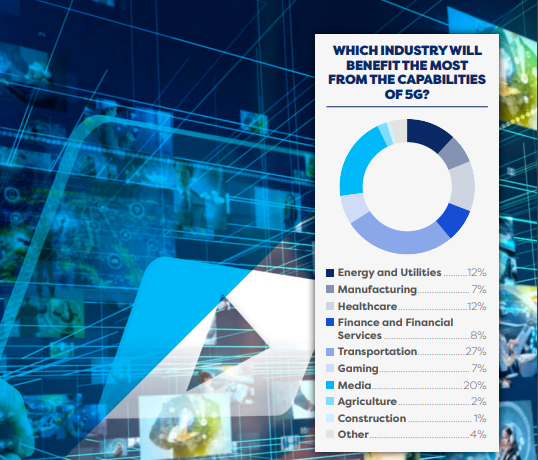Transportation is the key sector that will benefit the most from 5G rollout, says a survey conducted by KNect365 on around 300 stakeholders including telecom service providers, technology companies, analysts, consultants and associations.
While 26.71 percent of the respondents said they put their money on transportation, survey participants in the Middle East and North Africa felt that media industry would gain the most from low latency, high speed 5G networks.
While 5G may not directly influence content innovation, the blistering speed and minimal latency will result in zero lag transmission of live events and sports, the report said. As a result, downloading, as opposed to streaming, will come back in fashion.
Respondents from Africa believed that the finance and manufacturing sectors will gain most from 5G. 5G will enable faster banking and payment transactions, but the biggest advantage of 5G will be in the use of third-party APIs and dashboards which are already being used widely in banking, the report said.
APAC responders also voted for media and transport while Latin American responders felt transport was the top industry that will benefit most out of 5G.
Gaming is put forth as an area that will benefit greatly from increased investment in 5G, especially because it is bound to open up AR and VR gaming and take them to the next level. Currently latency and lag issues mean that this branch of technology hasn’t grown fully to be embraced by the general
Artificial Intelligence and Machine to machine (M2M) have become buzzwords within digital transformation and also stands to benefit exponentially from the development and roll out of 5G technology.
On the consumer level, some experts see 5G replacing wired services- as long as the price-point is comparable. There were similar promises made when 4G was being rolled out but data volume price point per GB still doesn’t match those available on wired services, notes the research agency.
In healthcare, telemedicine would gain crucial bandwidth with 5G. Remote diagnosis over video link and the ability to carry out surgical procedures across a 5G network using robotic instruments could become more of a reality. Wearable sensors for patient monitoring will integrate with the IoT capability within 5G.
V2X, device-to device communication for vehicles, will be one of the best use case around connected cars. Connected cars can exhibit benefits when they are in a 5G enabled zone and there are other vehicles near it which support 5G with V2X in the same direction as this vehicle.
Apart from the existing use cases, 5G makes it possible to develop new use cases in specific sectors and will support the modernization and digital transformation of many industries including connected robotics, autonomous transport and vehicles, industry 4.0 and smart cities.
In future, 5G will enable businesses to evolve and allow workers to free themselves from the boundaries of a local wired network or the performance limitations of Wi-Fi. It should also be the basis for flexible and seamless collaborative work.
As it evolves further, 5G will also become a central part of the digitization of companies, accelerating the shift towards cloud applications while offering redundancy of business access for a better service continuity, according to the report presented as part of the 5G World 2019 conference.






